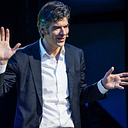The Donna — #HackingMentalHealth
The story of John and his AI embodied wellbeing assistant.
The Hackathon
Hacking Mental Health — Data Science & creativity: find a solution to improve the mental health of those struggling in the COVID pandemic
Now that the COVID-19 crisis has lasted for over a year, the consequences of mental health have shown to be worthy of attention. “The impact of the pandemic on people’s mental health is already extremely concerning,” said Dr Tedros Adhanom Ghebreyesus, Director-General of the World Health Organization. “Social isolation, fear of contagion, and loss of family members is compounded by the distress caused by loss of income and often employment.” Therefore, our challenge is to apply Artificial Intelligence and Data Science to do good: find a solution to improve the mental health of those struggling during these testing times.
In the ‘Hacking Mental Health’ hackathon, organized by the student team FruitPunch AI Eindhoven and the study association D.S.A. Pattern, participants will determine what factors contribute to a decrease in mental health and will try to formulate a solution to this pressing world issue.
The Story
John is a high performance worker and has been so all his life.
What he isn’t noticing, is that he is becoming more and more stressed. Instead of realizing this, he takes on more work than before to deal with these unknown sensations — John is slowly becoming burned out without realizing this.
The story of John is not unique, and is representative for many people each with a different background and story
It is important to understand this since
- 10–20% of our population normally struggle with mental health issues.
- The data from this hackathon shows this number is increasing, especially for the young and the highly educated people.
- In the Netherlands alone the total market of mental health care is about 6 billion euros and affects 1.5–6 million citizens. Not counting the loss of economic growth due to burnout and anxiety affecting productivity.
Globally this number is of course significantly higher.
How is this problem addressed now?
Traditional healthcare focuses on dealing with symptoms once the problem has manifested itself. The efficacy of known medical and psychological interventions is quite low, and completely reliant on people self-reporting their condition.
A different approach
We propose a different approach focusing on a data driven model. Which helps with early detection, prevention and social integration.
CoronaCalm does this in 3 ways
- Identify who is struggling by using automatic detection of psychometric signals based on the measurement coming from the body using video and audio AI profiling
- Providing a safe and secure service that guarantees privacy, while at the same showing they are not alone
- We will offer alternative ways of dealing with stress. These recommendations will improve over time, based on AI analyses of which solutions work best for which kinds of people.
The Pitch
Our team
Bjorn Heijligers
Drs. B.M.R. Heijligers | LinkedIn
Even Lepsoy
Komeil
Komeil Raisian, Ph.D. | LinkedIn
